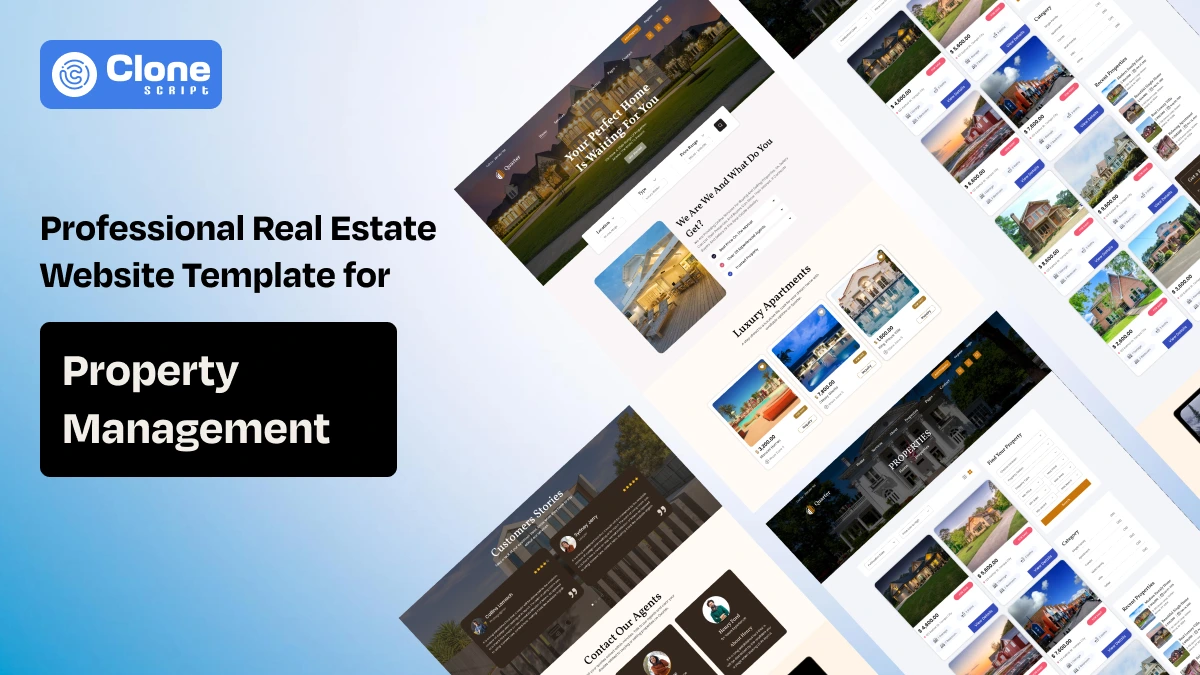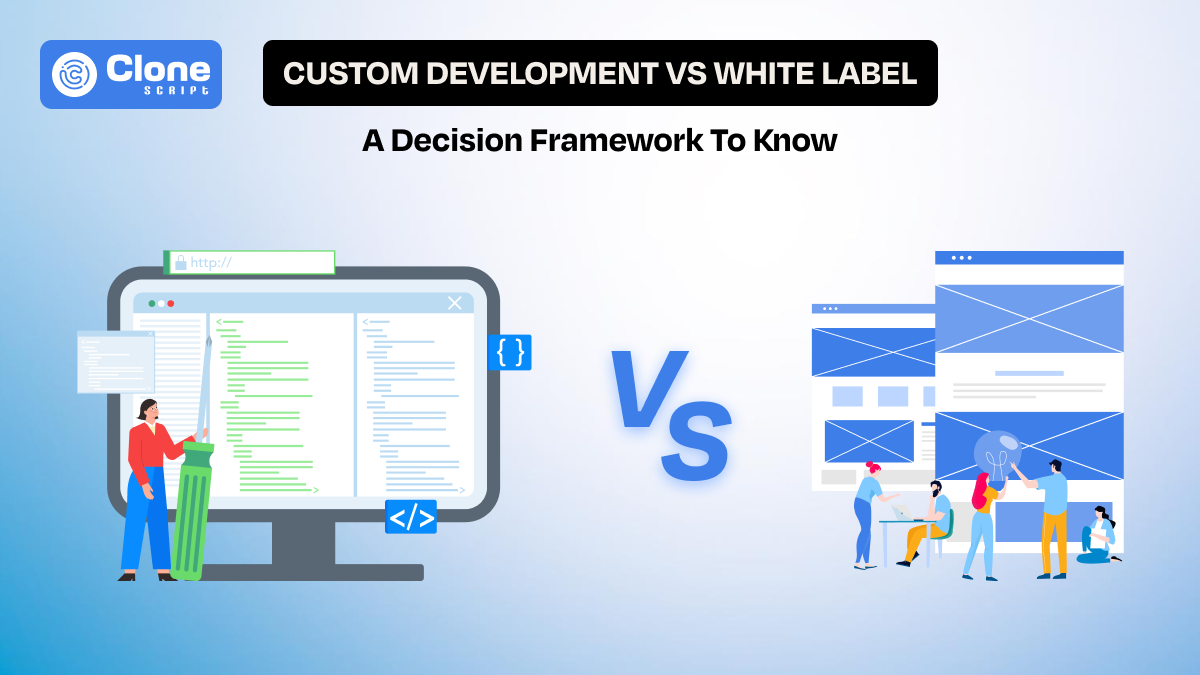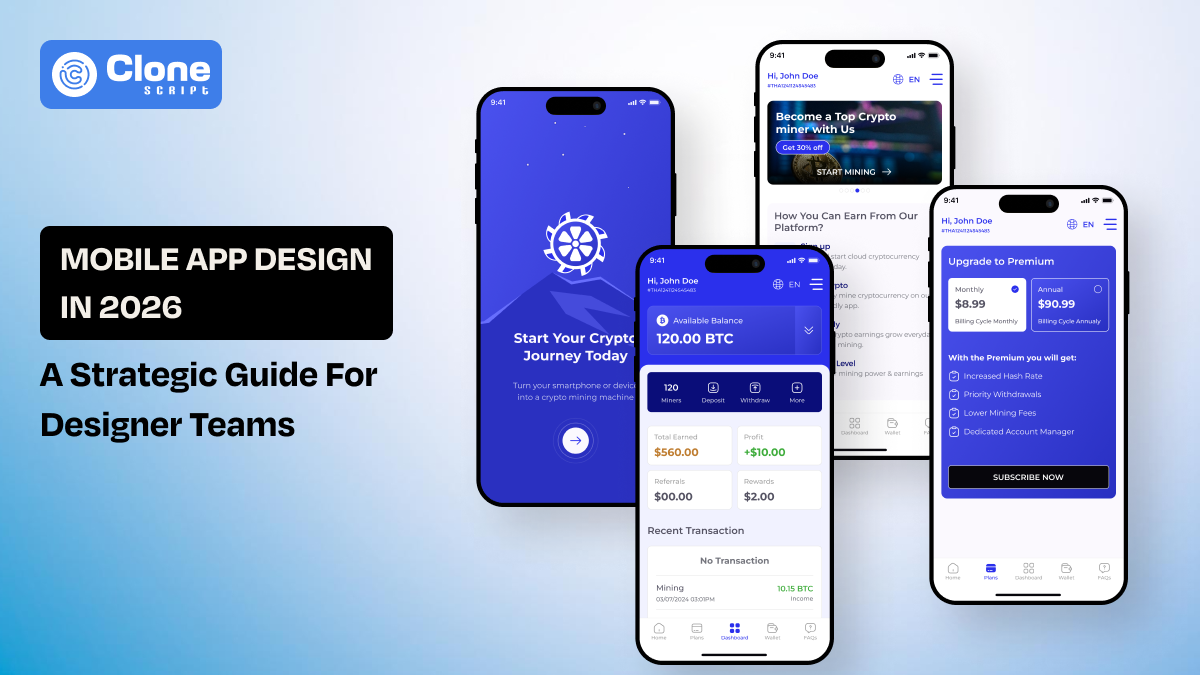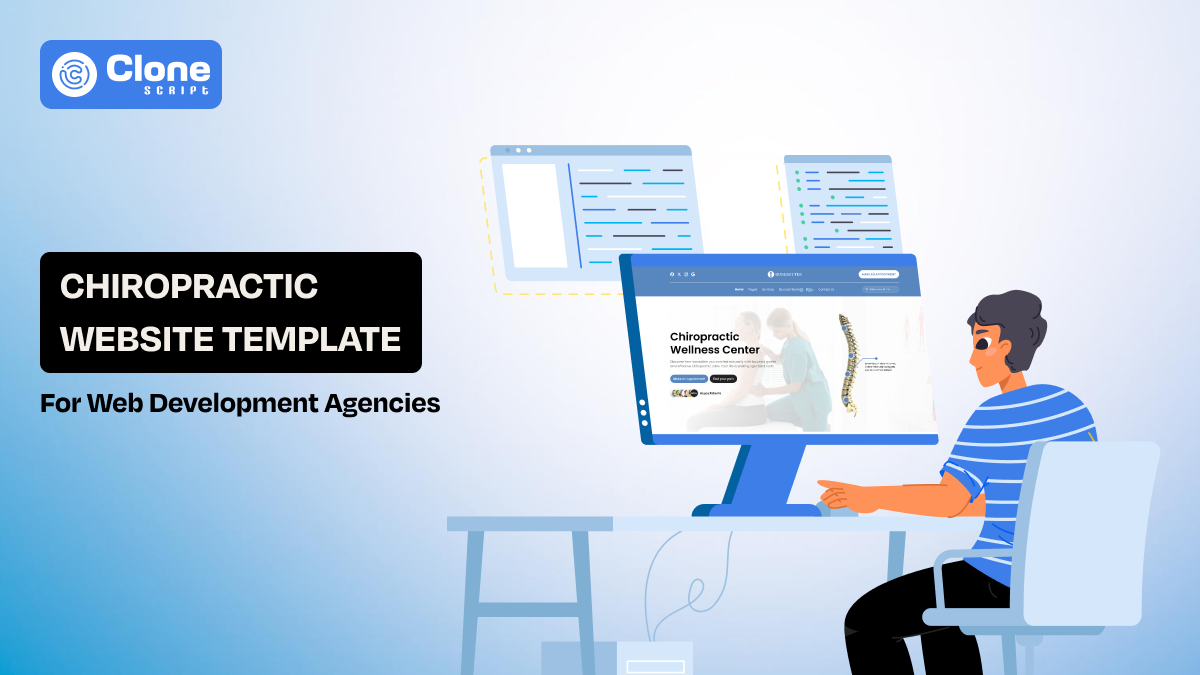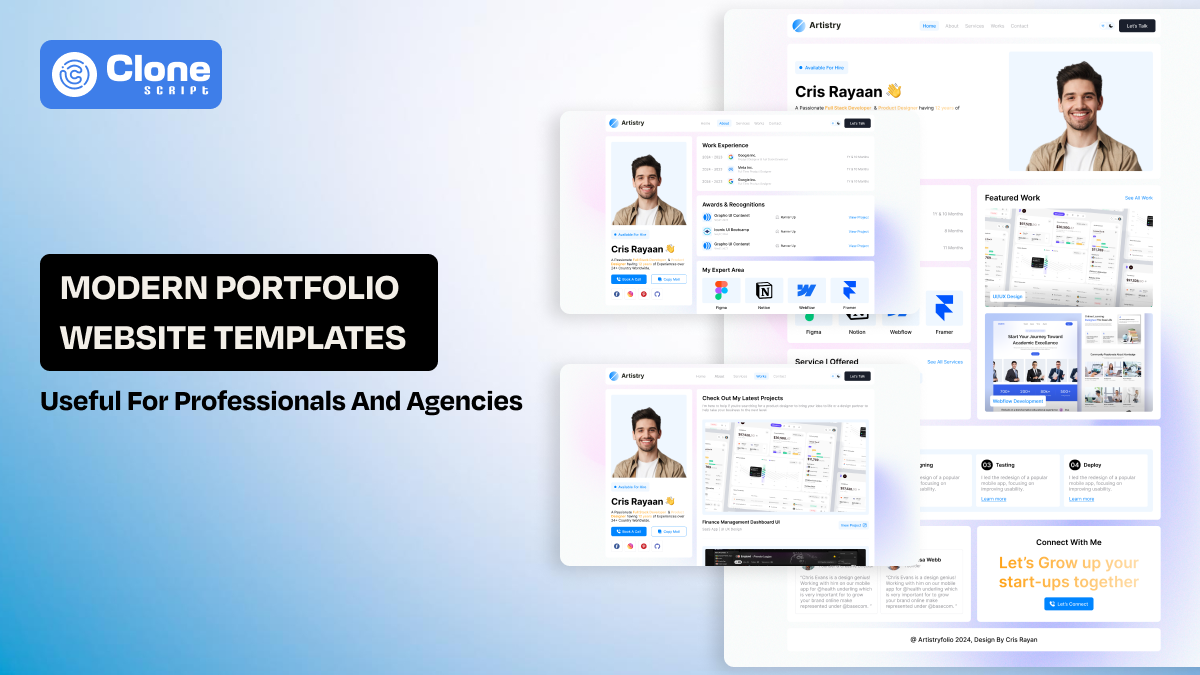Professional Real Estate Website Template for Property Management
In today’s digital age, having a professional online presence is essential for any property management business. Your website is often the first point of contact between you and potential tenants or property owners. A well-designed website builds trust and helps showcase your listings, streamline communication, and boost online growth.
Using professional real estate website templates can transform your online presence into a powerful marketing tool that sets you apart in a competitive market. This article will talk about why a website template proves to be a game-changer for your digital real estate business.
The Digital Shift in Property Management
Gone are the days when property management relied solely on physical offices and word-of-mouth recommendations. With the increasing popularity of online property searches, more people are making decisions based on the websites they visit. This shift to digital real estate means that having a modern, easy-to-navigate website is no longer a luxury, it’s a necessity.
For example, a prospective tenant browsing online for their next home. They’re not just looking for any website; they’re searching for a platform that provides clear, up-to-date listings, user-friendly features, and easy access to essential information.
A professional website can make that difference. It shows that you are serious about your business, care about your clients, and are keeping pace with technology trends.
Why a Professional Website Matters in the Real Estate Business?
Your website is your digital storefront. Just as a physical office or building can attract or deter customers, your online presence plays a crucial role in how people view your business.
Here are a few reasons why a professional real estate website is so important:
-
Building Trust: A well-designed website gives visitors confidence that you are reliable and serious about your work. It reflects professionalism and helps establish your credibility that others can’t copy.
-
Showcasing Your Properties: High-quality photos, virtual tours, and detailed descriptions help potential tenants see what you have to offer without needing to visit in person.
-
Streamlining Communication: Features like online contact forms and tenant portals make it easy for clients to get in touch or resolve issues quickly. Whether it's paying rent, submitting a maintenance request, or asking a question, your website makes it easy for tenants and landlords to connect with you.
-
Enhancing Your Brand: A strong, consistent online presence helps you stand out from competitors and builds a lasting impression on your audience. This is what is considered a USP of your property management platform.
Key Features of a High-Quality & Responsive Property Management Website Template
When choosing real estate website HTML templates, not every design will fit the unique needs of property management. Look for templates that deliver on both form and function as mentioned:
1. Responsive Design
Having a responsive website for a real estate business is a golden ticket to getting maximum users and converting them into clients. It’s also important from an SEO perspective to be recognized as a reputable property management business in the eyes of search engines like Google.
Here are the two aspects to be noted:
-
Adaptability:
Your website should look great on any device, whether it’s a desktop, tablet, or smartphone. Responsive web design ensures that visitors have a consistent experience no matter how they access your site.
-
User Experience:
A mobile-friendly real estate website not only keeps users engaged but also improves your search engine rankings. The reason is that fast loading times and intuitive navigation keep potential clients engaged on your site.
2. User-Friendly Navigation and Design
Any of the website's UI/UX design lays the foundation of success and user retention. In real estate property management business websites, the best web design speaks the words that resonate with users’ expectations.
When selecting a real estate website template, make sure you focus on:
-
Clear Layouts:
A clutter-free, intuitive website design for a real estate platform helps visitors find the information they need without frustration. Clear menus, easy-to-read fonts, and logical navigation paths are available in responsive real estate web templates.
-
Visual Appeal:
High-quality images and a modern design not only make your site more attractive but also enhance the overall user experience. Remember, a visually pleasing site made with modern web UI design trends can keep visitors on your page longer, increasing the chances of conversion.
3. Easy Property Listing Management
A website template with complete functionality of property listing tools is a good solution after all. From it, you can not only allow landlords to list their properties, but you can also monitor the policies and regulations of your platform.
Take the following into consideration:
-
Simplicity:
Look for templates that offer choices to easily add, update, and remove property listings. A user-friendly content management system (CMS) is key to keeping the listings current and attractive. This will improve the site’s conversion rates and bring the solutions.
-
Flexibility:
As tenants want to surf your website they want to see various properties in formats like grid to detailed listings. So, when picking a template then check whether this functionality exists or not. If you find a free property listing website template but it does not have the functionality, then skip to make it part of your business. It's better to go with premium templates.
4. Integrated Tenant Portals
With a complete tenant portal, you can check how the business is going so far. Are there any changes required, or is it already optimized for better conversions? Prefer the real estate platform templates that come with a built-in portal section. Take an overview and know how it can be helpful.
-
Convenience:
Tenant portals empower residents to pay rent, submit maintenance requests, and communicate directly with your team, all has been done through online systems. This added functionality makes life easier for both you and your tenants.
-
Efficiency:
By streamlining routine tasks through a dedicated portal, you can focus more on providing exceptional service and less on administrative hassles. This results in better revenue generation and brand image improvement.
5. Software Integration
The HTML website template you consider for your property listing platform makes sure it’s easily integrated with the softwares. So, your site will perform better online with proper functionality.
-
Seamless Operations:
The best website templates work well with property management softwares. This integration means your leasing agreements, maintenance schedules, and other critical data are always up-to-date. There will be no other issues you have to face to run your site efficiently.
-
Real-Time Updates:
With integrated software, you can ensure that any changes you make in one system are reflected immediately on your website. This keeps your information accurate and reliable.
6. Site Speed Optimization
A quick-loading real estate website template will be considered a complete solution to launch a platform where tenants can find properties quickly without too much waiting.
-
Fast Loading Times:
A slow website can drive potential tenants away. A template follows practices like using caching, optimizing your code, and compressing images to ensure your site loads quickly. That is why website templates are becoming a premium choice ahead of custom development.
-
Conversion Rate Optimization:
To convert maximum site visitors into paying customers, the site should be responsive and load faster. If the visitors are getting the information quickly without too much intervention, they are likely to consider your business. This can lead to higher engagement and lower bounce rates.
Future Trends to Be Introduced in Real Estate Websites
Building a website from pre-built templates doesn’t mean following future trends. With a new tech stack, real estate website templates bring functionality.
Here are a few emerging trends to consider:
1. Virtual Tours and 3D Visualization
Virtual tours and 3D property visualizations allow potential tenants to explore properties from the comfort of their own homes. These interactive features can significantly boost engagement.
Incorporating these technologies into your website makes your listings more attractive and helps differentiate your business from competitors.
2. AI-Powered Chatbots
AI chatbots can provide immediate responses to common questions, guiding visitors through your website and helping them find the information they need. This not only enhances the user experience but also frees up your staff to handle more complex inquiries.
With a chatbot, your website can offer round-the-clock support, ensuring that no potential lead goes unanswered.
3. Augmented Reality (AR)
AR tools let prospective tenants see how their furniture or decor might look in a space. This added layer of interactivity can help them envision themselves in the property, helping to make a decision.
Using AR technology positions your property management business as forward-thinking and innovative, appealing to a modern, tech-savvy audience.
Simple Steps to Transform Your Online Real Estate Business Presence
Ready to upgrade your property management website? Follow these steps to get started:
1. Assess Your Needs:
Identify which features are most important to your business. Do you need better listing management, a tenant portal, or payment gateway integration?
2. Explore Your Options:
Research different website templates online from marketplaces. Look for reviews and testimonials from other property managers to find the best fit for your needs.
3. Customize Your Template:
Tailor the custom real estate template for property showcase to match your brand identity. Adjust colors, fonts, and layouts to ensure your website reflects your unique style.
4. Partner with a Web Developer:
Purchasing just a web template doesn’t guarantee to launch of a website. For that you have to contact a website developer to add new functionality. All Clone script is the best website development company for the property management business. Contact us now.
5. Stay Current:
Regularly update your website with new content, features, and QA & testing. Keeping up with digital trends will help maintain your competitive edge.
Conclusion
Having a professional website is essential for success in property management. It helps build trust, attract more clients, and make property listings easy to browse. A well-designed real estate website also improves communication with tenants and streamlines daily tasks.
By using high-quality website templates, you can create a modern, user-friendly site without starting from scratch. Investing in the right template today will help your business grow and stay ahead in the digital real estate market.
Ready to elevate your online presence? Contact us for custom real estate website templates today and take your property management business to the next level!
 BTC - Bitcoin
BTC - Bitcoin
 USDTERC20 - USDT ERC20
USDTERC20 - USDT ERC20
 ETH - Ethereum
ETH - Ethereum
 BNB - Binance
BNB - Binance
 BCH - Bitcoin Cash
BCH - Bitcoin Cash
 DOGE - Dogecoin
DOGE - Dogecoin
 TRX - TRON
TRX - TRON
 USDTTRC20 - USD TRC20
USDTTRC20 - USD TRC20
 LTC - LiteCoin
LTC - LiteCoin

